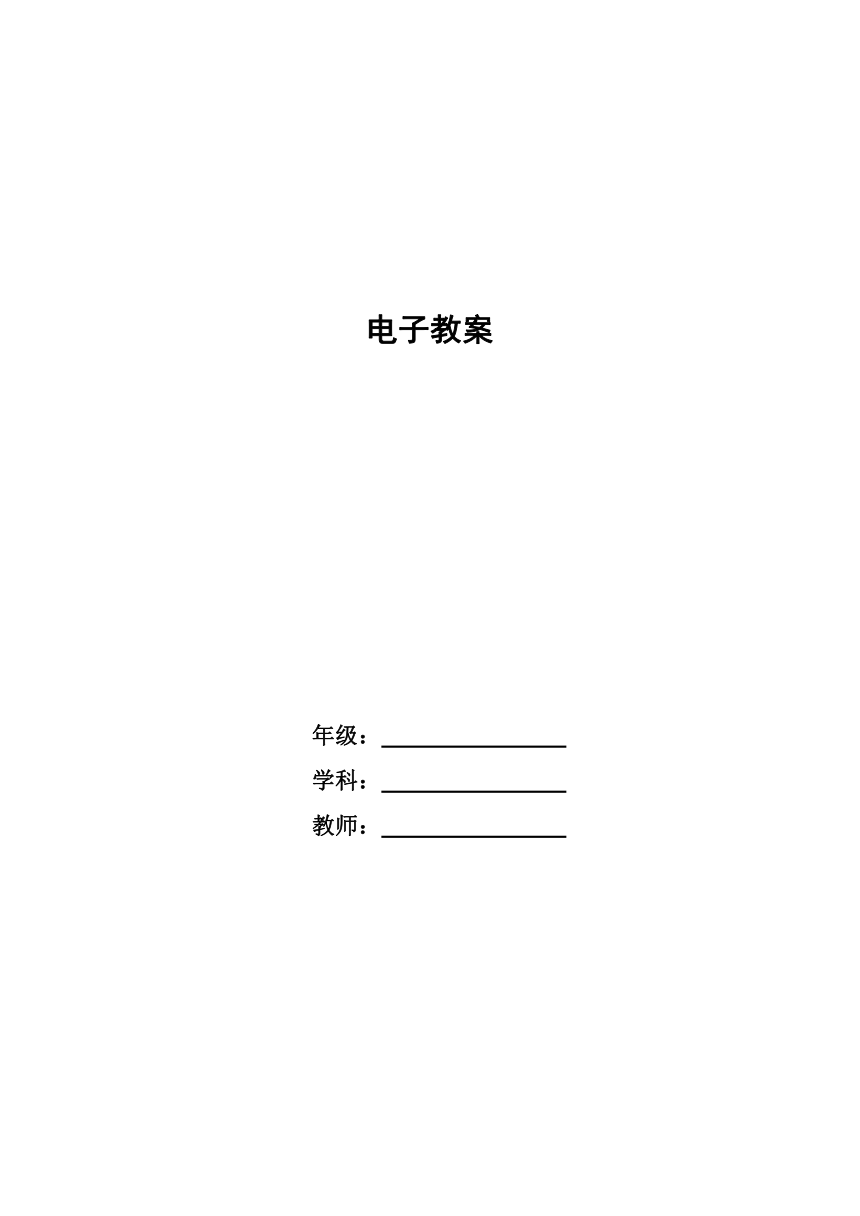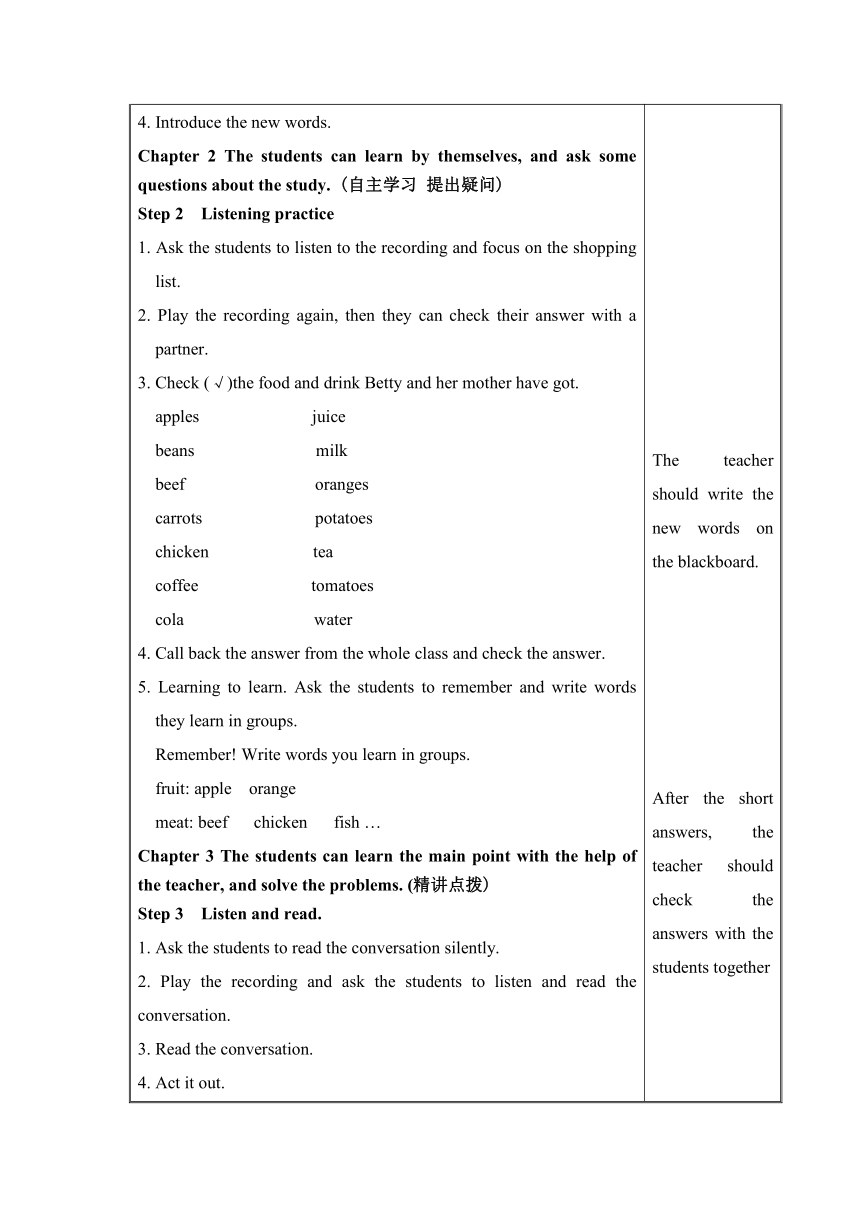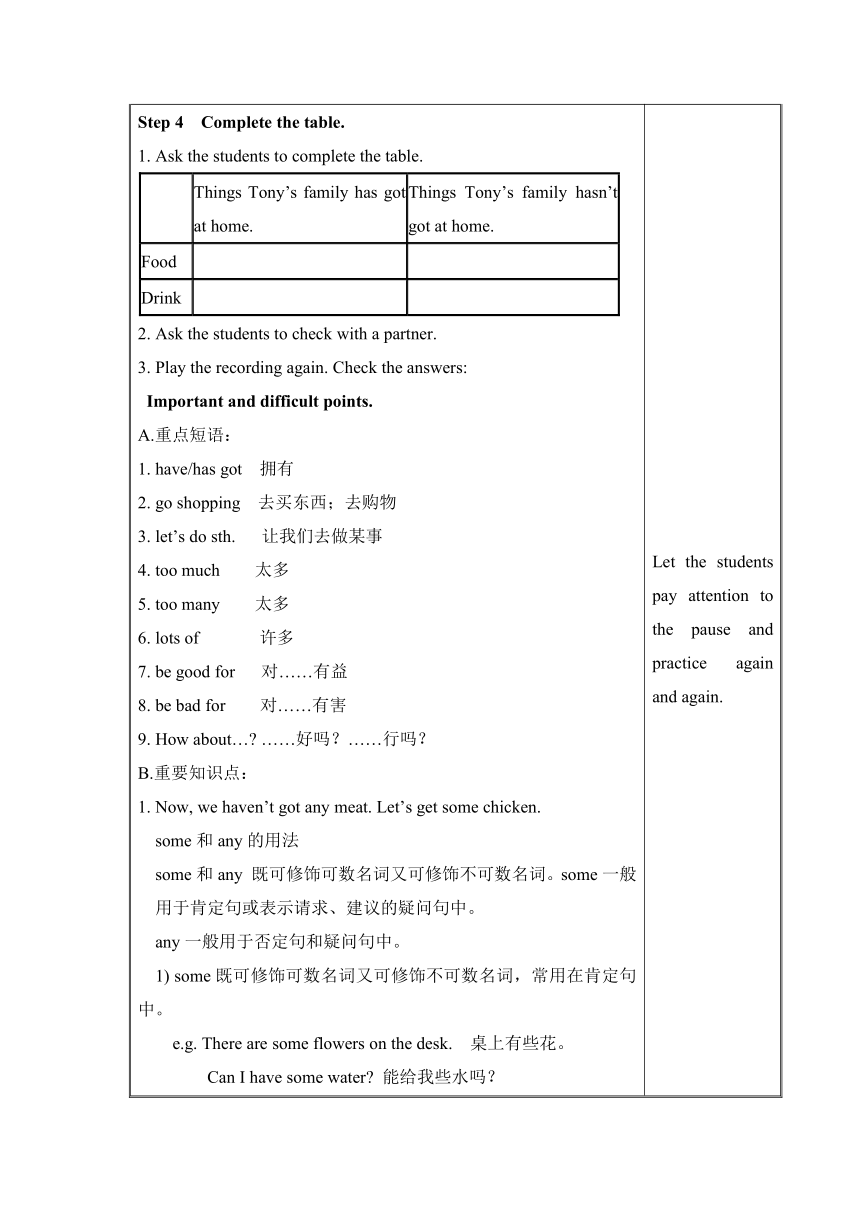Module 4 Healthy foodUnit 1 We’ve got lots of apples.教案
文档属性
| 名称 | Module 4 Healthy foodUnit 1 We’ve got lots of apples.教案 |

|
|
| 格式 | zip | ||
| 文件大小 | 560.9KB | ||
| 资源类型 | 教案 | ||
| 版本资源 | 外研版 | ||
| 科目 | 英语 | ||
| 更新时间 | 2015-09-23 20:15:22 | ||
图片预览





文档简介
电子教案
年级:
学科:
教师:
课 题 Unit 1 We’ve got lots of apples. 共 1课时
主备教师 使用教师
备课日期 上课日期
教材分析 教学目标 Key vocabulary: food ( http: / / www.21cnjy.com ), drink, candy, fruit, meat, vegetable, apple, bean, beef, carrot, chicken, chocolate, coffee, cola, juice, milk, potato, tea, tomato., water, shop, have, get, have got, some, much, kind, so, has, badKey phrase: go shopping, lots of, too muchKey structures: have / has got How about…
教学重难点 1. To understand conversations involving food and drink.2. To talk about food.
课 型 Listening and speaking 授课方法 Top-down approach
教具准备 Tape recorder, OHP, video
教与学的设计 我的修改
Chapter 1 Lead-in : Warming up(营造氛围,导入新课)Step 1 Warming-up1. Show some pictures of food and drink. Say what they are.2. Look at the pictures. Label the food and drink. ( http: / / www.21cnjy.com ) ( http: / / www.21cnjy.com ) ( http: / / www.21cnjy.com ) ( http: / / www.21cnjy.com )Answers: 1. fruit 2. meat 3. vegetables 4. drink a. melon b. apple ( http: / / www.21cnjy.com )c. orange d. chicken e. pork f. beef g. tomato h. potato i. carrot j. onion k. water l. milk m. juice3. Read the words after the teacher.4. Introduce the new words.Chapter 2 The student ( http: / / www.21cnjy.com )s can learn by themselves, and ask some questions about the study. (自主学习 提出疑问)Step 2 Listening practice1. Ask the st ( http: / / www.21cnjy.com )udents to listen to the recording and focus on the shopping list.2. Play the recordi ( http: / / www.21cnjy.com )ng again, then they can check their answer with a partner.3. Check (√)the food and drink Betty and her mother have got. apples juicebeans milkbeef orangescarrots potatoeschicken tea coffee tomatoescola water4. Call back the answer from the whole class and check the answer.5. Learning to le ( http: / / www.21cnjy.com )arn. Ask the students to remember and write words they learn in groups.Remember! Write words you learn in groups.fruit: apple orangemeat: beef chicken fish …Chapter 3 The stu ( http: / / www.21cnjy.com )dents can learn the main point with the help of the teacher, and solve the problems. (精讲点拨)Step 3 Listen and read.1. Ask the students to read the conversation silently.2. Play the recording ( http: / / www.21cnjy.com )and ask the students to listen and read the conversation.3. Read the conversation.4. Act it out.Step 4 Complete the table.1. Ask the students to complete the table. Things Tony’s family has got at home.Things Tony’s family hasn’t got at home.Food Drink 2. Ask the students to check with a partner.3. Play the recording again. Check the answers: Important and difficult points.A.重点短语:1. have/has got 拥有2. go shopping 去买东西;去购物3. let’s do sth. 让我们去做某事4. too much 太多5. too many 太多6. lots of 许多7. be good for 对……有益8. be bad for 对……有害9. How about… ……好吗?……行吗?B.重要知识点:1. Now, we haven’t got any meat. Let’s get some chicken. some和any的用法 some和any 既可修饰可数名词又可修饰不可数名词。some一般用于肯定句或表示请求、建议的疑问句中。 any一般用于否定句和疑问句中。 1) some既可修饰可数名词又可修饰不可数名词,常用在肯定句中。 e.g. There are some flowers on the desk. 桌上有些花。 Can I have some water 能给我些水吗?2) any 可修饰可数名词复数或不可数名词,常用于疑问句和否定句。 e.g. I can’t see any tea. 我没看见茶叶。 Do you have any friends at school 你在学校有些朋友吗 3) any也可用于肯定句,但表示的是“任何一个”的意思,后常接可数名词单数。 e.g. Any student can answer this question. 任何学生都可以回答这个问题。4) 在表示建议,反问,请求的疑问句中,或期望得到肯定回答时,多用some而不用any。 e.g. Would you like some coffee 你要不要来点咖啡 How about some fruit juice 来点水果汁如何 根据句意选用some或any填空。1) We have got ______ tomatoes in the fridge.2) Are there _____ basketballs in the sports hall 3) _____ nurse can help you in this hospital.4) There isn’t _____ coffee in the cup.5) Can I have _____ cola, Dad Keys: 1. some 2. any 3. Any 4. any 5. some2. We’ve got lots of apples. lots of = a lot of 许多它既可以修饰可数名词,相当于many;也可以修饰不可数名词,相当于much。 e.g. There are lots of apples on the desk. 桌子上有很多苹果。 We have got lots of meat at home. 我们家里有许多肉。many, much的用法:1) many 许多,用来修饰可数名词。 e.g. Are there many students in his class 他的班上有很多学生吗? I haven’t got many English books. 我没有很多英语书。2) much许多 用来修饰不可数名词。 e.g. We haven’t got much work to do. 我们没有太多工作要做。 Is there much milk in the bottle 瓶子里有很多牛奶吗? 3. Too much chocolate isn’t good for you. too much 太多,用来修饰不可数名词 e.g. I have got too much homework to do today. 我今天有太多的作业要做。 too many 太多,用来修饰可数名词复数形式 e.g. There are too many students in our class. 我们班上有太多的学生。据句意选用too much或too many填空。(1)There are ________ birds on the playground.(2)Don’t drink ________ cola.Keys: . (1)too many (2)too muchbe good for 对……有好处,它的反义词组是be bad for。e.g. Running is good for your health. 跑步对你身体有好处。 Smoking is bad for your health. 吸烟对你的健康有害。4. We’ve got ( http: / / www.21cnjy.com )lots of apples. We haven’t got any oranges, so let’s get some. have got表示所属关系,意为“某人有某物”。 1) 表示“某人有某 ( http: / / www.21cnjy.com )物”时要用“主语+have / has got ...”来表达,其中主语为第三人称单数时用has got, 其余一律用have got。 e.g. They have got a big television. 他们有个大电视。 She has got a table. 她有张桌子。2) 含有have / has got的肯定句变为否定句时,在have或has后加not 即可。 e.g. They haven’t got a big television. 他们没有大电视。 She hasn’t got a table. 她没有桌子。3) 含有have / has got的肯定句变为一般疑问句时,只须将have或has提前到句 首;其肯定回答为:Yes, 主语(人称代词)+have / has.。 否定回答为:No, 主语(人称代词)+haven’t / hasn’t.。e.g. Have they got ( http: / / www.21cnjy.com )a big television Yes, they have. / No, they haven’t. 他们有大电视吗?是的,他们有。/ 不,他们没有。 Has she got a table Yes, she has. / No, she hasn’t. 她有桌子吗?是的,她有。/ 不,她没有。there be与have gotthere be表示某个地方有某物或某人,表示的是“存在”,而have got表示的是“所有”。e.g. I have got a new book. 我有一本新书。 There is a new book on the desk. 桌子上放着一本新书。have got和there be 有时表达的意思有些相近,但句型和侧重点还是有不同。e.g. We haven’t got any meat in the fridge. 我们冰箱里没肉了。 There isn’t any meat in the fridge. 冰箱里没有肉了。两句都表示冰箱里没有肉,但是第一句强调“我们没有肉了”,冰箱是次要的;而第二句则强调“冰箱里不有肉了”,至于其他地方,就无从知晓了。Chapter 4 Effective practice, consolidate the knowledge(训练巩固) Step 9 Do exercises:A.单词拼写:1. Let’s go shopping for food and _______ (饮料).2. We haven’t got any _______ (肉).3. Let’s get some _______ (鸡肉).4. Have you got _____ (一些) chocolate 5. What _______ (种类) of fruit do you like best 6. Let’s get some _______ (咖啡) for mum.7. How about some apple _______ (果汁) 8. There are lots of _________ (西红柿) in the basket.Keys: 1.drink 2. meat 3 ( http: / / www.21cnjy.com ). chicken 4. any 5. kinds 6. coffee 7. juice 8. tomatoesB. 按要求改写句子:1. There is some fish on the plate .(改为否定句)________________________________________________________2. We have got some oranges .(改为一般疑问句)________________________________________________________3. They have got some milk and water .(改为否定句)________________________________________________________4. There is a tomato on the table .(改为复数形式)________________________________________________________5. He has got a potato .(改为复数形式)________________________________________________________Keys: 1. There isn’t any fish on the plate. 2. Have you got any oranges 3. They haven’t got any milk and water. 4. There are some tomatoes on the table.5. They have got some potatoes.C. 完成句子1. 吃太多巧克力对你不好。Eating too much chocolate _______________ you.2.我通常星期天购物。I usually _______________ on Sundays.3. 买些土豆怎样?___________ buying some _________ 4. 我们没有水果了,让我们去买些吧。We ______________ fruit, let’s _________.5. 他爸爸有许多好朋友。His father ______________________ good friends.Chapter 5 Summary evaluation, leak turnover(总结评价,查漏补缺)Key phrase: go shopping, lots of, too muchKey structures: have / has got How about The pictures are ( http: / / www.21cnjy.com )about The Great Wall, The Terracotta Army, The Three Gorges Dam and so on.After matching the w ( http: / / www.21cnjy.com )ords, the teacher should ask the students to read the wordsThe teacher should write the new words on the blackboard.After the short an ( http: / / www.21cnjy.com )swers, the teacher should check the answers with the students togetherLet the students pay attention to the pause and practice again and again.
作业布置 Make a list abo ( http: / / www.21cnjy.com )ut healthy food and drink, then make another list about unhealthy food and drink.
板书设计 Unit 1 We’ve got lots of apples.1. have/has got 拥有 2. go shopping 去买东西;去购物3. let’s do sth. 让我们去做某事 4. too much 太多5. too many 太多 6. lots of 许多7. be good for 对……有益 8. be bad for 对……有害
课后反思
年级:
学科:
教师:
课 题 Unit 1 We’ve got lots of apples. 共 1课时
主备教师 使用教师
备课日期 上课日期
教材分析 教学目标 Key vocabulary: food ( http: / / www.21cnjy.com ), drink, candy, fruit, meat, vegetable, apple, bean, beef, carrot, chicken, chocolate, coffee, cola, juice, milk, potato, tea, tomato., water, shop, have, get, have got, some, much, kind, so, has, badKey phrase: go shopping, lots of, too muchKey structures: have / has got How about…
教学重难点 1. To understand conversations involving food and drink.2. To talk about food.
课 型 Listening and speaking 授课方法 Top-down approach
教具准备 Tape recorder, OHP, video
教与学的设计 我的修改
Chapter 1 Lead-in : Warming up(营造氛围,导入新课)Step 1 Warming-up1. Show some pictures of food and drink. Say what they are.2. Look at the pictures. Label the food and drink. ( http: / / www.21cnjy.com ) ( http: / / www.21cnjy.com ) ( http: / / www.21cnjy.com ) ( http: / / www.21cnjy.com )Answers: 1. fruit 2. meat 3. vegetables 4. drink a. melon b. apple ( http: / / www.21cnjy.com )c. orange d. chicken e. pork f. beef g. tomato h. potato i. carrot j. onion k. water l. milk m. juice3. Read the words after the teacher.4. Introduce the new words.Chapter 2 The student ( http: / / www.21cnjy.com )s can learn by themselves, and ask some questions about the study. (自主学习 提出疑问)Step 2 Listening practice1. Ask the st ( http: / / www.21cnjy.com )udents to listen to the recording and focus on the shopping list.2. Play the recordi ( http: / / www.21cnjy.com )ng again, then they can check their answer with a partner.3. Check (√)the food and drink Betty and her mother have got. apples juicebeans milkbeef orangescarrots potatoeschicken tea coffee tomatoescola water4. Call back the answer from the whole class and check the answer.5. Learning to le ( http: / / www.21cnjy.com )arn. Ask the students to remember and write words they learn in groups.Remember! Write words you learn in groups.fruit: apple orangemeat: beef chicken fish …Chapter 3 The stu ( http: / / www.21cnjy.com )dents can learn the main point with the help of the teacher, and solve the problems. (精讲点拨)Step 3 Listen and read.1. Ask the students to read the conversation silently.2. Play the recording ( http: / / www.21cnjy.com )and ask the students to listen and read the conversation.3. Read the conversation.4. Act it out.Step 4 Complete the table.1. Ask the students to complete the table. Things Tony’s family has got at home.Things Tony’s family hasn’t got at home.Food Drink 2. Ask the students to check with a partner.3. Play the recording again. Check the answers: Important and difficult points.A.重点短语:1. have/has got 拥有2. go shopping 去买东西;去购物3. let’s do sth. 让我们去做某事4. too much 太多5. too many 太多6. lots of 许多7. be good for 对……有益8. be bad for 对……有害9. How about… ……好吗?……行吗?B.重要知识点:1. Now, we haven’t got any meat. Let’s get some chicken. some和any的用法 some和any 既可修饰可数名词又可修饰不可数名词。some一般用于肯定句或表示请求、建议的疑问句中。 any一般用于否定句和疑问句中。 1) some既可修饰可数名词又可修饰不可数名词,常用在肯定句中。 e.g. There are some flowers on the desk. 桌上有些花。 Can I have some water 能给我些水吗?2) any 可修饰可数名词复数或不可数名词,常用于疑问句和否定句。 e.g. I can’t see any tea. 我没看见茶叶。 Do you have any friends at school 你在学校有些朋友吗 3) any也可用于肯定句,但表示的是“任何一个”的意思,后常接可数名词单数。 e.g. Any student can answer this question. 任何学生都可以回答这个问题。4) 在表示建议,反问,请求的疑问句中,或期望得到肯定回答时,多用some而不用any。 e.g. Would you like some coffee 你要不要来点咖啡 How about some fruit juice 来点水果汁如何 根据句意选用some或any填空。1) We have got ______ tomatoes in the fridge.2) Are there _____ basketballs in the sports hall 3) _____ nurse can help you in this hospital.4) There isn’t _____ coffee in the cup.5) Can I have _____ cola, Dad Keys: 1. some 2. any 3. Any 4. any 5. some2. We’ve got lots of apples. lots of = a lot of 许多它既可以修饰可数名词,相当于many;也可以修饰不可数名词,相当于much。 e.g. There are lots of apples on the desk. 桌子上有很多苹果。 We have got lots of meat at home. 我们家里有许多肉。many, much的用法:1) many 许多,用来修饰可数名词。 e.g. Are there many students in his class 他的班上有很多学生吗? I haven’t got many English books. 我没有很多英语书。2) much许多 用来修饰不可数名词。 e.g. We haven’t got much work to do. 我们没有太多工作要做。 Is there much milk in the bottle 瓶子里有很多牛奶吗? 3. Too much chocolate isn’t good for you. too much 太多,用来修饰不可数名词 e.g. I have got too much homework to do today. 我今天有太多的作业要做。 too many 太多,用来修饰可数名词复数形式 e.g. There are too many students in our class. 我们班上有太多的学生。据句意选用too much或too many填空。(1)There are ________ birds on the playground.(2)Don’t drink ________ cola.Keys: . (1)too many (2)too muchbe good for 对……有好处,它的反义词组是be bad for。e.g. Running is good for your health. 跑步对你身体有好处。 Smoking is bad for your health. 吸烟对你的健康有害。4. We’ve got ( http: / / www.21cnjy.com )lots of apples. We haven’t got any oranges, so let’s get some. have got表示所属关系,意为“某人有某物”。 1) 表示“某人有某 ( http: / / www.21cnjy.com )物”时要用“主语+have / has got ...”来表达,其中主语为第三人称单数时用has got, 其余一律用have got。 e.g. They have got a big television. 他们有个大电视。 She has got a table. 她有张桌子。2) 含有have / has got的肯定句变为否定句时,在have或has后加not 即可。 e.g. They haven’t got a big television. 他们没有大电视。 She hasn’t got a table. 她没有桌子。3) 含有have / has got的肯定句变为一般疑问句时,只须将have或has提前到句 首;其肯定回答为:Yes, 主语(人称代词)+have / has.。 否定回答为:No, 主语(人称代词)+haven’t / hasn’t.。e.g. Have they got ( http: / / www.21cnjy.com )a big television Yes, they have. / No, they haven’t. 他们有大电视吗?是的,他们有。/ 不,他们没有。 Has she got a table Yes, she has. / No, she hasn’t. 她有桌子吗?是的,她有。/ 不,她没有。there be与have gotthere be表示某个地方有某物或某人,表示的是“存在”,而have got表示的是“所有”。e.g. I have got a new book. 我有一本新书。 There is a new book on the desk. 桌子上放着一本新书。have got和there be 有时表达的意思有些相近,但句型和侧重点还是有不同。e.g. We haven’t got any meat in the fridge. 我们冰箱里没肉了。 There isn’t any meat in the fridge. 冰箱里没有肉了。两句都表示冰箱里没有肉,但是第一句强调“我们没有肉了”,冰箱是次要的;而第二句则强调“冰箱里不有肉了”,至于其他地方,就无从知晓了。Chapter 4 Effective practice, consolidate the knowledge(训练巩固) Step 9 Do exercises:A.单词拼写:1. Let’s go shopping for food and _______ (饮料).2. We haven’t got any _______ (肉).3. Let’s get some _______ (鸡肉).4. Have you got _____ (一些) chocolate 5. What _______ (种类) of fruit do you like best 6. Let’s get some _______ (咖啡) for mum.7. How about some apple _______ (果汁) 8. There are lots of _________ (西红柿) in the basket.Keys: 1.drink 2. meat 3 ( http: / / www.21cnjy.com ). chicken 4. any 5. kinds 6. coffee 7. juice 8. tomatoesB. 按要求改写句子:1. There is some fish on the plate .(改为否定句)________________________________________________________2. We have got some oranges .(改为一般疑问句)________________________________________________________3. They have got some milk and water .(改为否定句)________________________________________________________4. There is a tomato on the table .(改为复数形式)________________________________________________________5. He has got a potato .(改为复数形式)________________________________________________________Keys: 1. There isn’t any fish on the plate. 2. Have you got any oranges 3. They haven’t got any milk and water. 4. There are some tomatoes on the table.5. They have got some potatoes.C. 完成句子1. 吃太多巧克力对你不好。Eating too much chocolate _______________ you.2.我通常星期天购物。I usually _______________ on Sundays.3. 买些土豆怎样?___________ buying some _________ 4. 我们没有水果了,让我们去买些吧。We ______________ fruit, let’s _________.5. 他爸爸有许多好朋友。His father ______________________ good friends.Chapter 5 Summary evaluation, leak turnover(总结评价,查漏补缺)Key phrase: go shopping, lots of, too muchKey structures: have / has got How about The pictures are ( http: / / www.21cnjy.com )about The Great Wall, The Terracotta Army, The Three Gorges Dam and so on.After matching the w ( http: / / www.21cnjy.com )ords, the teacher should ask the students to read the wordsThe teacher should write the new words on the blackboard.After the short an ( http: / / www.21cnjy.com )swers, the teacher should check the answers with the students togetherLet the students pay attention to the pause and practice again and again.
作业布置 Make a list abo ( http: / / www.21cnjy.com )ut healthy food and drink, then make another list about unhealthy food and drink.
板书设计 Unit 1 We’ve got lots of apples.1. have/has got 拥有 2. go shopping 去买东西;去购物3. let’s do sth. 让我们去做某事 4. too much 太多5. too many 太多 6. lots of 许多7. be good for 对……有益 8. be bad for 对……有害
课后反思
同课章节目录
- Starte
- Module 1 My teacher and my friends
- Module 2 My English lesson
- Module 3 My English book
- Module 4 My everyday life
- Module 1 My classmates
- Unit 1 Nice to meet you.
- Unit 2 I'm Wang Lingling and I'm thirteen years ol
- Unit 3 Language in use.
- Module 2 My family
- Unit 1 Is this your mum?
- Unit 2 These are my parents.
- Unit 3 Language in use.
- Module 3 My school
- Unit 1 There are thirty students in my class.
- Unit 2 The library is on the left of the playgroun
- Unit 3 Language in use.
- Module 4 Healthy food
- Unit 1 We've got lots of apples.
- Unit 2 Is your food and drink healthy?
- Unit 3 Language in use.
- Module 5 My school day
- Unit 1 I love history.
- Unit 2 We start work at nine o'clock.
- Unit 3 Language in use.
- Revision module A
- Module 6 A trip to the zoo
- Unit 1 Does it eat meat?
- Unit 2 The tiger lives in Asia.
- Unit 3 Language in use.
- Module 7 Computers
- Unit 1 How do I write my homework on the computer?
- Unit 2 When do you use a computer?
- Unit 3 Language in use.
- Module 8 Choosing presents
- Unit 1 I always like birthday parties.
- Unit 2 She often goes to concerts.
- Unit 3 Language in use.
- Module 9 People and places
- Unit 1 We're enjoying the school trip a lot.
- Unit 2 They're waiting for buses or trains.
- Unit 3 Language in use.
- Module 10 Spring Festival
- Unit 1 Are you getting ready for Spring Festival?
- Unit 2 My mother's cleaning our houses and sweepin
- Unit 3 Language in use.
- Revision module B
